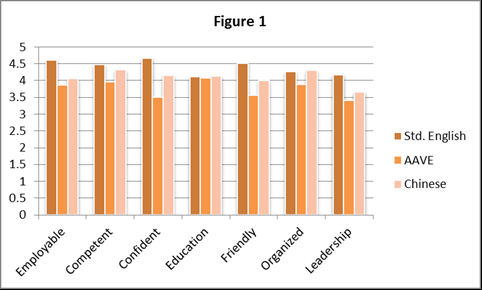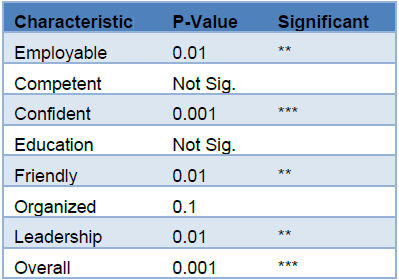Stephanie Hedges and David Eddington, Linguistics
Accents affect employment ratings more when the accent is perceived to be stronger (Carlson & McHenry, 2006). When the accent is strongly perceived by the employer, employment ratings drastically dropped for those speaking Spanish-influenced, Asian-influenced and African American English dialects (Carlson & McHenry, 2006). However, when the accent was only minimally perceived, employment ratings remained high (Carlson & McHenry, 2006). This proposes that accents only negatively impact employment when maximally perceived by the employer (Carlson & McHenry, 2006).
The purpose of this research is to investigate how accents affect the hiring process. I first recorded three interviews with applicants with a Standard English accent, an African American Vernacular English (AAVE) accent, and a Chinese accent. Then I had participants listen to the interviews and rate each interviewee on specific job characteristics on a scale from one to five. The research suggests that the accent will have an effect in the job interview process with the Standard American accent being rated as being more employable and the AAVE accent as less so.
My research had 20 participants listen to three similar job interviews for the position of Public Relations for a company. Each interview consisted of an applicant with one of the three accents: an African American accent, an Asian accent, or a Standard American English accent. For each of the three recordings the participants filled out a questionnaire asking them to rank on a scale of 1-5 the applicant’s employability, competence for the Public Relations position, confidence, education, friendliness, organization, and leadership skills. We obtained our three speakers from students attending BYU or from the Provo area with the specific accents (Standard English, AAVE, and Chinese accent). I controlled for gender and age in order to further isolate the variable of accent. To analyze the results, I calculated the averages and performed an ANOVA to determine which variables were significant. My independent variable is be the accent and the dependent variables as the workplace characteristics ratings.
The data was analyzed the data using Analysis of Variance (ANOVA). The independent variable was accent, and the dependent variables were the workplace characteristics of employability, competency, confidence, education, friendliness, organized, and leadership ability, as well as a total grading calculated from all the ratings of the workplace characteristics for each accent (Standard English, Chinese, and AAVE) (Figure 1).
The averages shown in Figure 1 show that Standard American English was ranked higher in every characteristic except in organization and education level. In organization and education level, the Chinese accent was ranked higher. AAVE had lower rankings in every characteristic.
The ANOVA showed that employability, confidence, friendliness, leadership, and the overall question total were statistically significant, while the ratings for competence, education level, and organization were not statistically significant associated with the accent of the interviewee (Table 1).
The Standard American English accent was significantly ranked as being more employable (4.61) followed by the Chinese accent (4.05) and then the AAVE (3.85). This is very similar to the results for the confidence characteristic with the Standard American English receiving the highest rankings (4.66), followed by the Chinese accent (4.15), and then AAVE (3.50). Ratings of friendliness followed the same pattern: Standard American English (4.51), Chinese accent (3.99), and AAVE (3.56). When I looked at leadership skills, again, Standard American English was ranked the highest (4.17), then Chinese accent (3.65), and then AAVE (3.4).
While the results for competency, education level, and organization were not statically significant, AAVE is still ranked the lowest in all three characteristics. The Chinese accent was ranked higher in education level and organization, and very close behind Standard English in competency.
In conclusion, accents affect how we are perceived by others and can even discriminate against us in the workplace. However, not all accents lead to negative consequences. For example, Chinese accents may help lead to higher status jobs than speaking AAVE. However, Standard American English tends to be ranked higher in most workplace characteristics when compared with a Chinese accent and AAVE. It is interesting to note the AAVE was ranked lower in all characteristics. This may be because it is often associated with being from inner-city neighborhoods.
This study was limited by the number and types of accents that were tested, as well as the population size of the participants who listened to the interviews. Also, the speaker of AAVE was not as strong as the speaker was raised by white parents. Also, the participants were not a good representation of the United States employers. There needs to be more participants that more fully represent the population of employers from the United States.


